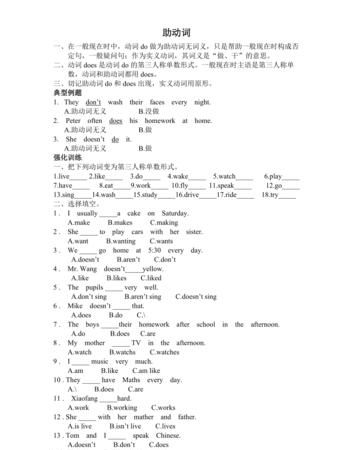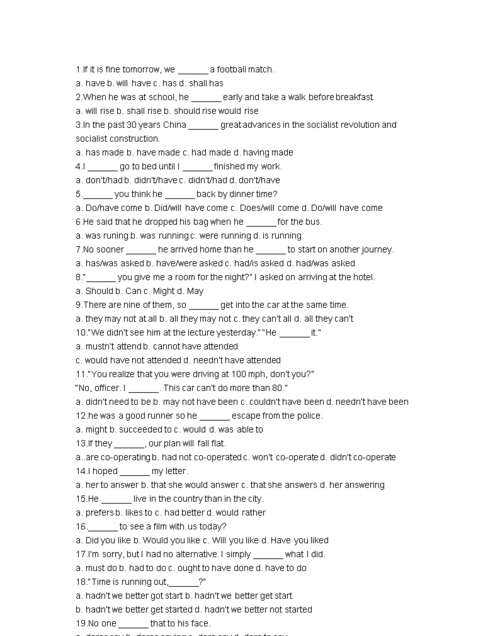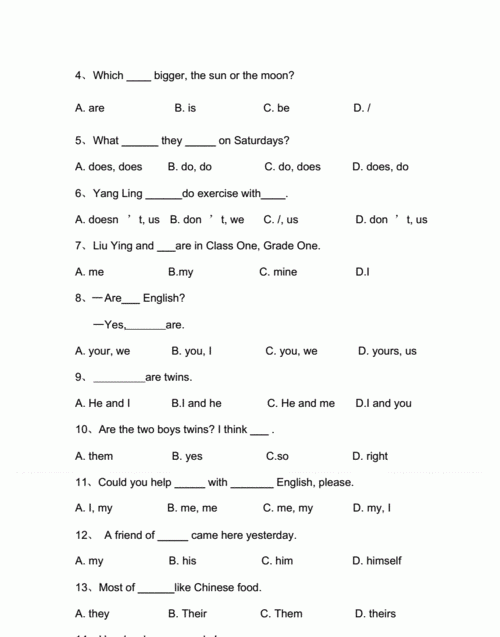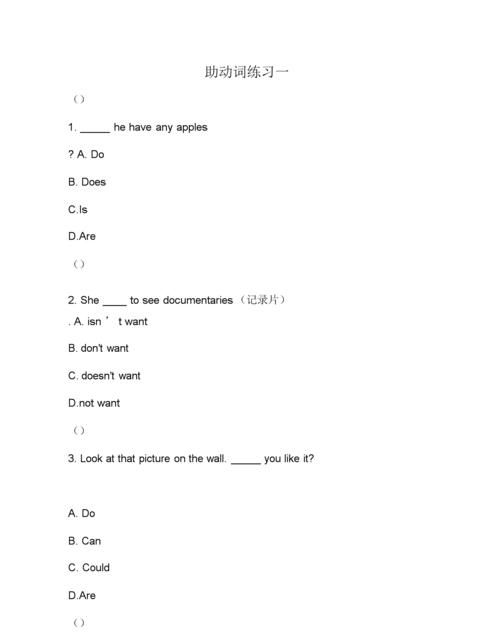本文目录
英语中的助动词是什么意思
【答案】
C
【解析】考查时态。主句用一般将来时态,条件状语从句中的信息词
now
表明空格处用一
般现在时态。句意:如果我们现在还不行动起来保护环境
,
我们将会后悔。
20.
【
2013
新课标
II
卷
7
】
We_______ very early so we packed the night before.
A. leave
B. had left
C. were leaving
D. have left
【答案】
C
【解析】考查动词时态。动词
leave
的时行体表示
"
按计划、安排要做的事情
"
。句意:因为
计划很早离开,所以我们头晚就打好了包。
21.
【
2013
安徽
24
】
I’m calling about the apartment you_______ the other day. Could you tell me
more about it?
A. advertised
B. had advertised
C. are advertising
D. will advertise
【答案】
A
【解析】考查时态。题中结构
the other day
表明用一般过去时。句意:我来电咨询有关你广
告的公寓情况,能告诉一些吗?
22.
【
2013
北京
32
】
—
So what is the procedure?
—
All the applicants _______ before a final decision is made by the authority.
A. interview
B. are interviewing
C. are interviewed
D. are being interviewed
【答案】
C
【解析】
考查动词的语态和时态。
句中
applicants
与
interview
之间为被动关系,
用被动语态;
句子描述一般情况,
用一般现在时态的被动语态。
句意:
做最终决定前所有的申请人需面试。
23.
【
2013
山东
24
】
I didn’t think I’d like the movie, but actually it _______ pretty good.
A. has been
B. was
C. had been
D. would be
【答案】
B
【解析】考查动词时态。句意:我认为我不会喜欢这部电影,而实际上这电影相当好。题中
信息
did
n’t
时态为一般过去时态,陈述过去的事实。
24.
【
2013
山东
27
】
—
Oh no! We’re too late. The train _______ .
—
That’s Ok. We’ll catch the next train to London.
A. was leaving
B
. had left
C. has left
D. has been leaving
【答案】
C
【解析】
考查动词时态。
—
太晚了,
火车已离开了。
—
没关系。
我们可赶下一趟火车去伦敦。
句意表明可知火车已经离开,对现在造成影响,用现在完成时态。
25.
【
2013
四川】
3.Hurry up, kids! The school bus _______ for us!
A. waits
B. was waiting
C. waited
D. is waiting
【答案】
D
【解析】考查动词时态。意:快点儿!校车在等我们!现在进行时表示讲话时正发生的事。
句意表明空格处的动作在目前正在发生,用现在时行时

助动词常见的助动词有
1、助动词的用法口诀:
助动词,用法怪;只当佐料不当菜。
句型变换显身手;常与时态谈恋爱。
have完成be进行;will将来三大块。
加上各自过去式;总共构成六时态。
否定疑问靠它们;用法如同be相待。
一般现在和过去;没有助动也无碍。
否定疑问照常变;过去did,do现在。
第三人单用does;遵守be法和情态。
2、协助主要动词构成谓语的词叫助动词(Auxiliary Verb),也叫辅助动词。被协助的动词称作主要动词(Main Verb)。助动词用来构成时态和语态。 助动词具有语法意义,但除情态助动词外没有词汇意义,不可单独作谓语。它没有对应的汉译,例如: He doesnt like English. 他不喜欢英语。(does是助动词,无词义;like是主要动词,有词义)。

助动词用法的题目及答案
1.If it is fine tomorrow, we ______ a football match.
a. have b. will have c. has d. shall has
2.When he was at school, he ______ early and take a walk before breakfast.
a. will rise b. shall rise b. should rise would rise
3.In the past 30 years China ______ great advances in the socialist revolution and socialist construction.
a. has made b. have made c. had made d. having made
4.I ______ go to bed until I ______ finished my work.
a. don’t/had b. didn’t/have c. didn’t/had d. don’t/have
5.______ you think he ______ back by dinner time?
a. Do/have come b. Did/will have come c. Does/will come d. Do/will have come
6.He said that he dropped his bag when he ______ for the bus.
a. was runing b. was running c. were running d. is running
7.No sooner ______ he arrived home than he ______ to start on another journey.
a. has/was asked b. have/were asked c. had/is asked d. had/was asked
8.“______ you give me a room for the night?” I asked on arriving at the hotel.
a. Should b. Can c. Might d. May
9.There are nine of them, so ______ get into the car at the same time.
a. they may not at all b. all they may not c. they can’t all d. all they can’t
10.“We didn’t see him at the lecture yesterday.” “He ______ it.”
a. mustn’t attend b. cannot have attended
c. would have not attended d. needn’t have attended
11.“You realize that you were driving at 100 mph, don’t you?”
“No, officer. I ______. This car can’t do more than 80.”
a. didn’t need to be b. may not have been c. couldn’t have been d. needn’t have been
12.he was a good runner so he ______ escape from the police.
a. might b. succeeded to c. would d. was able to
13.If they ______, our plan will fall flat.
a. are co-operating b. had not co-operated c. won’t co-operate d. didn’t co-operate
14.I hoped ______ my letter.
a. her to answer b. that she would answer c. that she answers d. her answering
15.He ______ live in the country than in the city.
a. prefers b. likes to c. had better d. would rather
16.______ to see a film with us today?
a. Did you like b. Would you like c. Will you like d. Have you liked
17.I’m sorry, but I had no alternative. I simply ______ what I did.
a. must do b. had to do c. ought to have done d. have to do
18.“Time is running out,______?”
a. hadn’t we better got start b. hadn’t we better get start
c.hadn ’t we better get started d. hadn’t we better not started
19.No one ______ that to his face.
a. dares say b. dares saying c. dare say d. dare to say
20.The students in the classroom ______ not to make so much noise.
a. need b. ought c. must d. dare
21.You ______ last week if you were really serious about your work.
a. ought to come b. ought to be coming c. ought have come d. ought to have come
22.The elephants ought ______ hours ago by the keepers.
a. to be fed b. to feed c. to being fed d. to have been fed
23.“I wonder why they’re late.” “They ______ the train.”
a. can have missed b. could miss c. may have missed d. might miss
24.“Tom graduated from college at a very young age.”
“He ______ have been an outstanding student.”
a. must b. could c. should d. might
25.You ______ the examination again since you had already passed it.
a. needn’t have taken b. didn’t need to take c. needn’t take d. mustn’t take
26.He is really incompetent! The letter ______ yesterday.
a. should be finished typing b. must be finished typing
c.must have finished typing c. should have been finished typing
27.The boy told his father that he would rather ______ an astronaut.
a. become b. to become c. becoming d. became
28.When we reached the station, the train had still not arrived; so we ______.
a. needed not to hurry b. needn’t have hurried
c. need not to have hurried d. didn’t need to hurry
29.Since your roommate is visiting her family this weekend,_____ you like to have dinner with us tonight?
a. will b. won’t c. wouldn’t d. do
30.He was afraid what he had done ______ a disastrous effect on his career.
a. might have b. could be c. have been d. shall be
四.答案
1-10 BDACDBDBCB 11-20 CDCBDBBCCB 21-30 DDCABDABCA

助动词有哪些
最常用的助动词有:be, have, has, do, does, shall, did, will, should, would等,助动词可以协助主要动词构成时态或者语态,也可构成疑问句和否定句,构成否定句时与否定副词not连用。
分类
半助动词
在功能上介乎主动词和助动词之间的一类结构,称为半助动词。常见的半助动词有be about to, be due to, be going to, be likely to, be meant to, be obliged to, be supposed to, be willing to, have to, seem to, be unable to, be unwilling to等。......
情态助动词
情态助动词 1.情态助动词包括will(would), shall(should), can(could), may(might), must, need, dare, ought to, used to, had better后接原形不定词。 2.情态助动词不受主语的人称和数的限制。 3.两个情态助动词不能连用。 中文:他将能够及时完成此事。 (误)He will can finish it i......
基本助动词
基本助动词 基本助动词只有三个:be, do, have, 它们没有词汇意义,只有语法作用,如协助构成进行体,完成体,被动态,否定句,疑问句等。 例如 He is giving a lecture. 他在作报告He has made a plan. 他已经订了计划The small animals are kept in the cages. 小动物都关在笼子里。
助动词协助主要动词完成以下功用
a. 表示时态,例如:
He is singing. 他在唱歌。
He has got married. 他已结婚。
b. 表示语态,例如:
He was sent to England. 他被派往英国。
c. 构成疑问句,例如:
Do you like college life? 你喜欢大学生活吗?
Did you study English before you came here? 你来这儿之前学过英语吗?
d. 与否定副词not合用,构成否定句,例如:
I don't like him. 我不喜欢他。
e. 加强语气,例如:
Do come to the party tomorrow evening. 明天晚上一定来参加晚会。
He did know that. 他的确知道那件事。
3) 最常用的助动词有:be, have, do, shall, will, should, would,did

以上就是关于助动词及动词专项训练 ,英语中的助动词是什么意思的全部内容,以及助动词及动词专项训练 的相关内容,希望能够帮到您。

